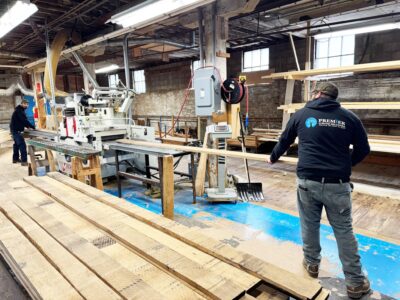Sales Tick Up Throughout The Lake States Region
Sources that were contacted in the Lake States region differed a bit as to how their sales were faring at the time of this writing. One source noted that his market is doing well and is up from six months ago. Another source mentioned that while he is doing about as well as he was six months ago, his market hasn’t been steady and that he is still in the grips of winter.
In Minnesota, a lumberman said that his sales were doing well. “We are definitely doing better than we were six months ago,” he said. When asked why his sales were much stronger than they were, he stated that it was due to the fact that he was unable to procure any logs six months ago and that is not the case now.
His company offers Red and White Oak, White and Black Ash, Birch, Hard and Soft Maple, Basswood and Aspen in grades No. 2A Common and Better and all in 4/4 thickness. “Red Oak and Ash are our best sellers right now,” he said. He mentioned that Red Oak has picked up substantially due in part to loggers being able to go out and cut more of it with the ground frozen.
He sells to wholesalers. When asked if any of his customers had offered any comments as to how their sales were doing, he noted that he has to take what they say with a grain of salt. “They tell me that it has been harder for them to move product. This could be the case, but they wouldn’t be asking for wood all the time if it was the case,” he said.
He mentioned that while his company doesn’t do any imports or exports, that tariffs will still impact their business. “If tariffs are put on China, then it will impact our business. 80 percent of Red Oak that is cut in the U.S. goes into the Chinese market, so that price increase will have to be reflected somewhere,” he said. “Usually, it is the loggers that feel it first and the sawmills.”
In Michigan, a lumber salesperson said that his market has unfortunately remained the same. “Winter still has a hold on us,” he said. “So, our market hasn’t been able to level out. Our sales continue to go up and down.”
His company offers Red Oak in No. 1 Common and Better, Hard and Soft Maple in No. 2 Common and Better and Basswood and Aspen in Select and Better. All species are offered in 4/4 thickness. “Red Oak is probably our best seller. I understand that people are having a hard time getting White Oak, so that may have helped out our Red Oak product a bit,” he remarked, adding that Basswood and Aspen are his slowest sellers.
He sells to concentration yards. “They seem to be staying pretty steady, although I don’t think that they are setting any records,” he said. “They all seem pretty hopeful and think that there will be an uptick once spring comes.”
While his company doesn’t do any direct imports or exports, he said that he believes that tariffs will still impact his business. “I think that it will be a positive impact,” he said. “We have seen that the kiln-dried Pine goes into the industrial markets. When tariffs are imposed on those imports, we are able to sell more of the dense hardwood into that market,” he stated.
A lumber representative in Wisconsin noted that his market is doing well overall. “We are doing better than we were six months ago, mainly because prices are up from where they were,” he said.
His company offers Red and White Oak, Hard and Soft Maple, Ash, Basswood, Aspen, Hickory and Cherry in grades No. 3 and Better and primarily in 4/4 thickness, with the occasional 5/4 thickness. When asked which specie was selling the best for him, he said that Red and White Oak are his fastest sellers.
He sells to end-use manufacturers and distributors. “I don’t get a lot of feedback as to how their sales are doing, but their orders seem to be sporadic. It is still better than it was six to eight months ago,” he said.
He noted that while he is currently comfortable with his labor force that this could all change within a week.
He mentioned that his company does some exporting. “I’m not sure that the tariffs will cause us any issues. If they do, I believe that it will be short lived. They didn’t affect us the last time that they went into effect, so I’m not currently too concerned.”










